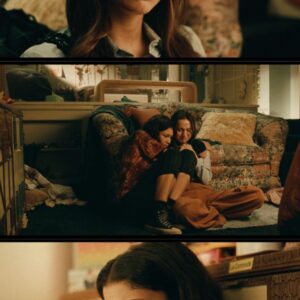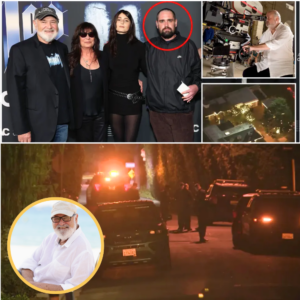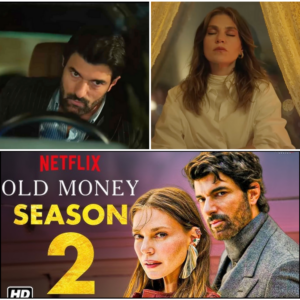In the hallowed corridors of Buckingham Palace, where whispers of tradition and duty echo eternally, a fresh rift has emerged—one that tugs at the very soul of the British monarchy. King Charles III, the 76-year-old sovereign who ascended the throne amid a cascade of personal and institutional upheavals, finds himself once again ensnared in familial discord. This time, the arrow strikes close to home: his estranged son, Prince Harry, the Duke of Sussex, has unleashed a pointed accusation that palace insiders—those shadowy “men in grey suits”—are deliberately undermining efforts to mend their fractured bond. The king’s reported response? A profound sadness, laced with perplexity, that underscores the poignant human fragility beneath the crown’s unyielding facade.
The drama unfolded in the crisp autumn of 2025, mere weeks after what should have been a beacon of hope: a private tea between father and son at Clarence House on September 10. For Harry, 41, living in self-imposed exile in California’s sun-drenched Montecito with his wife, Meghan, the Duchess of Sussex, and their children, Archie and Lilibet, this rendezvous marked the first face-to-face encounter in over 19 months. The last had been a hurried dash to London in February 2024, prompted by Charles’s cancer diagnosis—a revelation that briefly thawed the ice, allowing Harry to stand vigil at his father’s bedside. That fleeting solidarity, however, dissolved into silence, with Harry lamenting in a May 2025 BBC interview that his father “won’t speak to me,” despite his earnest pleas for reconciliation.
The September meeting, lasting a brisk 50 minutes amid London’s relentless drizzle, carried the weight of unspoken histories. Palace sources painted it as a tentative olive branch, a quiet exchange of pleasantries over Earl Grey, where gifts were swapped—a framed photograph from Charles, sans the Sussexes’ images, and perhaps a token from Harry in return. Optimists glimpsed the dawn of healing: Harry, it was rumored, floated ideas of more frequent UK visits, even bringing his young family across the Atlantic four or five times a year. Such gestures evoked memories of a more unified royal household, before the acrimony of 2020’s Megxit, Harry’s explosive memoir Spare in 2023, and the Netflix docuseries that laid bare the family’s inner demons.
Yet, no sooner had the teacups cooled than the narrative soured. British tabloids, ever the vultures circling scandal, reported Harry’s private frustrations: that the encounter felt “distinctly formal,” leaving him akin to an “official visitor” rather than a beloved son. Quotes emerged—allegedly from Harry’s inner circle—depicting the duke as disillusioned, sensing an orchestrated chill from the palace machine. The leaks, Harry countered swiftly through a spokesperson’s statement to People magazine on September 27, were “categorically false” and “pure invention.” Worse, they were the handiwork of “sources intent on sabotaging any reconciliation between father and son.” He pointed fingers squarely at the courtiers, those faceless bureaucrats in bespoke suits whom his late mother, Diana, Princess of Wales, once derided as the monarchy’s puppet masters—architects of her own downfall.
This salvo landed like a thunderclap in the rarefied air of royal relations. For Charles, who has navigated his reign with a blend of environmental zeal and quiet diplomacy, the accusation cut deeply. Royal insiders, speaking to The Times and The Sunday Telegraph, revealed the king as “saddened and perplexed”—emotions that resonate with a man who, after decades in waiting, now grapples with a legacy shadowed by division. “It’s very sad,” one palace aide confided, “especially because everyone has been working hard behind the scenes to make the private relationship work.” The monarch, they emphasized, views Harry not as a prodigal foe but as family—flawed, perhaps, but redeemable. Efforts to facilitate warmer ties had been underway: discreet channels opened, invitations extended, even whispers of public events where Harry might reappear on British soil, albeit sans official duties.
The king’s melancholy is compounded by the broader canvas of his rule. At 76, Charles confronts mortality with a stoicism honed by loss—his parents gone, his own cancer battle raging since early 2024, treatments that have thinned his once-vibrant frame. He has leaned on Queen Camilla, his steadfast consort, whose wry humor and unpretentious grace have steadied him through state banquets and investitures alike. Yet, the royal family’s public image, already battered by scandals, now risks further erosion. Prince William, the Prince of Wales and heir apparent, remains a steadfast bulwark, his focus laser-sharp on duties amid his wife Catherine’s own health trials. But William’s skepticism toward Harry runs deep, forged in the fires of betrayal; sources whisper he might have “tried to block” the September tea had he known in advance. The Waleses’ household, with its three young heirs—George, Charlotte, and Louis—embodies the monarchy’s future, a narrative of continuity that Harry’s barbs threaten to unravel.
Delving deeper, Harry’s grievances echo a litany of long-simmering resentments. The “men in grey suits” are, to him, the embodiment of institutional rigidity—a cabal that, he believes, orchestrated the stripping of his UK security detail post-Megxit, a decision upheld in a bruising May 2025 court loss. In that BBC interview, Harry accused Buckingham Palace representatives on the government’s security committee of wielding undue influence, prioritizing control over safety for him, Meghan, and their children. “All of these issues have been examined repeatedly,” the palace retorted coolly, aligning with judicial findings. Yet, for Harry, it’s personal: a continuation of the media hounding that claimed his mother’s life in 1997, the same press he now battles through lawsuits and public advocacy.
From Montecito’s gilded isolation, Harry has pivoted toward olive branches. Post-Spare, he shunned further tell-alls, channeling energy into the Invictus Games, his Archewell Foundation, and quiet philanthropy. The September visit, timed amid his solo UK jaunts for charity work, signaled a desire to bridge divides—not a full return, but a foothold. He envisions a looser arrangement: occasional cameos at family gatherings, perhaps even introducing Archie, 6, and Lilibet, 4, to their grandfather’s world of castles and corgis. “I would love a reconciliation with my family,” he told the BBC in May, his voice cracking with the vulnerability of a man torn between duty’s ghosts and a father’s instincts. No longer the fiery rebel of his youth, Harry seeks forgiveness, not absolution—aware that his public salvos have hardened hearts in Windsor.
But reconciliation demands reciprocity, and the palace draws firm lines. Charles, ever the constitutionalist, upholds the “no half-in, half-out” edict from the 2020 Sandringham Summit—a non-negotiable barring Harry from selective royal roles while pursuing commercial ventures. Meghan’s American endeavors, from lifestyle branding to Hollywood whispers, only widen the chasm; tabloids speculate on strains in their marriage, fueled by Harry’s UK pilgrimages sans spouse. Royal commentator Hilary Fordwich, speaking to Fox News, captured the impasse: Harry’s “counterproductive” outbursts have “reaffirmed Prince William’s skepticism,” making “future peace talks harder.” Broadcaster Helena Chard went further, likening the saga to a “reality show,” where trust’s erosion precludes true détente.
As autumn leaves swirl through Kensington Gardens, the king’s sadness manifests in subtler strokes. Charles, a painter at heart, has retreated to Highgrove, his Gloucestershire haven, where organic gardens and watercolors offer solace. Publicly, he soldiers on: presiding over investitures, championing climate accords at COP30 in November, and mending fences with Commonwealth realms chafing under colonial legacies. Privately, aides note his wistful glances at family photos—snapshots from sunnier days, when Harry was the cheeky spare, dashing through polo fields with brother William. The monarch dreams of unity, not for pomp’s sake, but for the grandchildren’s inheritance: a monarchy modeling forgiveness in an age of fracture.
Yet, the sabotage claims cast long shadows. Harry’s team decries the leaks as deliberate sabotage, preserving privacy’s sanctity; palace loyalists counter that senior aides toil invisibly for harmony, only to be maligned. The truth, as ever in royal intrigue, lies in the grey—ambiguous motives, anonymous briefings, a press ecosystem thriving on division. For Charles, the perplexity stems from this opacity: How to heal when accusations fly like arrows? His reign, now in its third year, grapples with modernity’s demands—slimming the Firm, amplifying diverse voices—while haunted by Diana’s specter, whose marital woes he once embodied, now redeemed in Camilla’s embrace.
Looking ahead, the path to thaw remains treacherous. Harry’s May overtures hinted at paternal urgency: “Even if my father doesn’t have long left,” he mused, a stark reminder of Charles’s health fragility. The king, undeterred, extends quiet invitations—perhaps a Christmas at Sandringham, where mince pies might melt resentments. William, however, stands sentinel, prioritizing institutional integrity over fraternal nostalgia. Meghan’s role looms large: her absence from the tea fuels speculation of deeper Sussex schisms, though allies insist it’s logistical, not emotional.
In this tableau of crowns and heartaches, Charles’s sadness is the quiet tragedy—a father’s longing clashing with a sovereign’s solitude. The monarchy, symbol of endurance, now tests its own resilience: Can it forgive as it endures? Harry’s accusations, born of pain, risk entrenching the exile he fled. Yet, amid the perplexity, flickers of grace persist—the exchanged gifts, the shared tea—reminders that reconciliation, like dawn, follows the longest night. For King Charles III, whose life has been a tapestry of reinvention, this chapter may yet weave redemption. Until then, his heart bears the weight, a monarch mournful not for the throne, but for the son who slipped its grasp.


